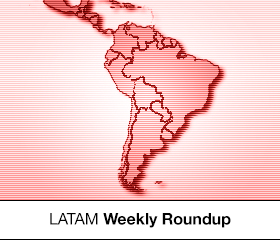Details of the Publisher Co-Op in Latin America; MediaMath Opens NMI in Sao Paulo
by on 18th Apr 2016 in News

In this week’s Latin American Roundup: Alejandro Alvarez, CEO, RPA Media Place, talks about the challenges of the first publisher co-op in Latin America and reveals that he has been talking to publishers in other countries that are willing to form a similar group; MediaMath announces its education branch in Brazil; Itau dedicates 80 people for data and automation campaigns, focusing now on mobile.
RPA: No doubt we will have news about publisher co-ops in Latin America by the end of the year
In an interview with Karen Ferraz, ExchangeWire Brazil, Alejandro Alvarez, CEO, RPA Media Place, gave details of the operations of the first publisher co-op in Latin America. RPA joins powerful media companies in Argentina such as Infobae, La Nación, Perfil, Telefé e, and the biggest media company, Grupo Clarín. According to Alvarez, the co-op has been able to accelerate programmatic in the country by two years since its launch, last September.
He also says that in the last months he has visited Brazil, Colombia, Mexico, Uruguai, Chile, and the US (Miami) to tell about RPA and help local publishers in a similar move. “I have no doubt that we will have news about it by the end of the year”, he said.
Alvarez celebrates the progress of the operations in Argentina. “Publishers get the benefit from innovation and the opportunity to receive the feedback from agencies and advertisers, being able to adjust their offers according to the market. The other side also get benefits, with an unique value proposition, being able to achieve 90% of reach using programmatic media” , said.
“Programmatic media was on the agenda of several advertisers, but they did not have an offer that fulfilled their needs”, said the CEO. “Now we fulfil that and also measure the performance according to different metrics. CTR, viewability, CPC, engagement…"
The executive says that the main reasons to form the publisher co-op was the absence of premium or brand-safe inventory for programmatic in Argentina. “RPA came as an answer to this scenario, with no limitations of formats. And this is a great change introduced by RPA in the local market: you have access to the entire inventory programmatically. We are shortening the lead in Argentina in two years, comparing to the evolution that would happen without us”, he completed. He also mentions that the alliance is offering training to agencies and marketers to assist them in creating campaigns with automation and data usage.
The biggest challenge to join the publishers was conciliating competitors. “In RPA, there are publishers for which digital represents less than 5% of their revenue, whereas others are 100% digital. It was important to find a middle-term and a long-term strategy”, said.
RPA operates with 56 websites, and they have around 350 clients. Of all the campaigns, 65% are open to the market, whereas 35% are via private marketplace. “In mature markets, this ratio is in between 40%-50% for PMP. We aim to achieve 40% this year”, reveals Alvarez.
MediaMath announces its NMI in Sao Paulo
After completing two years in Brazil with a local office and teams, MediaMath announced the opening of a local branch of its New Marketing Institute (NMI). The institute is an educational branch of the company, aiming to help the ad tech market with trainings and courses focused in the sector.
The institute is operating in Sao Paulo for a month and has already trained 60 people from three different companies. NMI also has operations in London, New York, City of Mexico, Buenos Aires, Singapore, and Chicago.
In a press statement, MediaMath said that despite the economic crises in Brazil, the operations have been going positive with a triple-digit growth. Its staff has grown by 200% in the period.
MMA Forum Brazil: mobile programmatic in practice
During the Mobile Marketing Association Forum in Sao Paulo, Brazil, one presentation was highlighted. Itau, local bank, gave details of their experience using data to target campaigns, accelerating customised offers to their audience.
According to Thiago Silva, director, Itau’s digital content and marketing team, user data and geolocation allowed insights that were the base to build regional campaigns. “We are aware and trying not to be invasive when we show that we know where the user is. It [the interaciton] has to be useful and in the right time, not being opportunistic, opening the window for a live CRM”, he said.
Silva said that now Itau has 80 people working in initiatives that uses data and automation for marketing campaigns. Branding using programmatic came after the first experiences, when the company understood what they could achieve with different storytelling targeting different users. “There is still a lot of space for programmatic to grow in our operations”, he said. He also believes that it is the marketer’s responsibility to spread the culture of automation to media trading, and to push the topic in the agencies with whom they work.
Digital MarketingDSPLATAMProgrammaticPublisher








Follow ExchangeWire